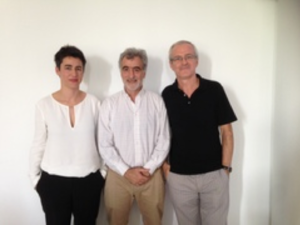
Political and training processes in the construction of capacities for Territorial Development: An approach to learning from experience
Pablo S Costamagna defended his doctoral thesis on October 30th, 2014, at the UPV/EHU Business School in Donostia. The thesis, titled “Los procesos políticos y de formación en la construcción de capacidades para el Desarrollo Territorial: Una aproximación al aprendizaje desde la experiencia (Political and training processes in the construction of capacities for Territorial Development: An approach to learning from experience)” has been carried out within the Doctoral programme in Development Studies and has been supervised by Mikel Zurbano and Miren Larrea.
The thesis analyses how the weaknesses or the absences of capacities in the territory is one of the critical factors to which the lack of success of many initiatives of Territorial Development are attributed. The thesis contributes to the understanding of the generation of capacities through the combination of politics and training. More specifically, the thesis studies how capacities for Territorial Development can be strengthened, constructed and generated by working on the idea of interaction between processes of training and politics, placing dialogue at the centre of its logic.
The thesis works on an analytic model that combines the experience of the author with the theory on Territorial Development in Latin America and in particular, in Argentina, to which he adds the approach of Local Human Development. This combination has its basis in action research and more specifically in the concept of praxis proposed by Paulo Freire.
The model allows for the establishment of a new analysis on the development of the experience of Rafaela, in the province of Santa Fe, Argentina and the observation of how these links between training and politics, such as the spaces for dialogue and the appearance of the figure of the facilitator of Territorial Development are produced.
In addition, the conceptual framework used to interpret the initial case study is applied in other contexts, in Reconquista, Argentina, Cusco, Peru and in the Gipuzkoa Regional Government, Basque Country, where positive conclusions of the outline are brought forward.
Finally, it is worth highlighting that this thesis contributes to the understanding of flows and connections within processes of Territorial Development and it delivers to politics new ways to reach territory, spaces of reflection and learning and, to training how to improve its flows with politics.
Similar theses


Details
-
Date2014 October 30
-
GradeDistinction Cum Laude
